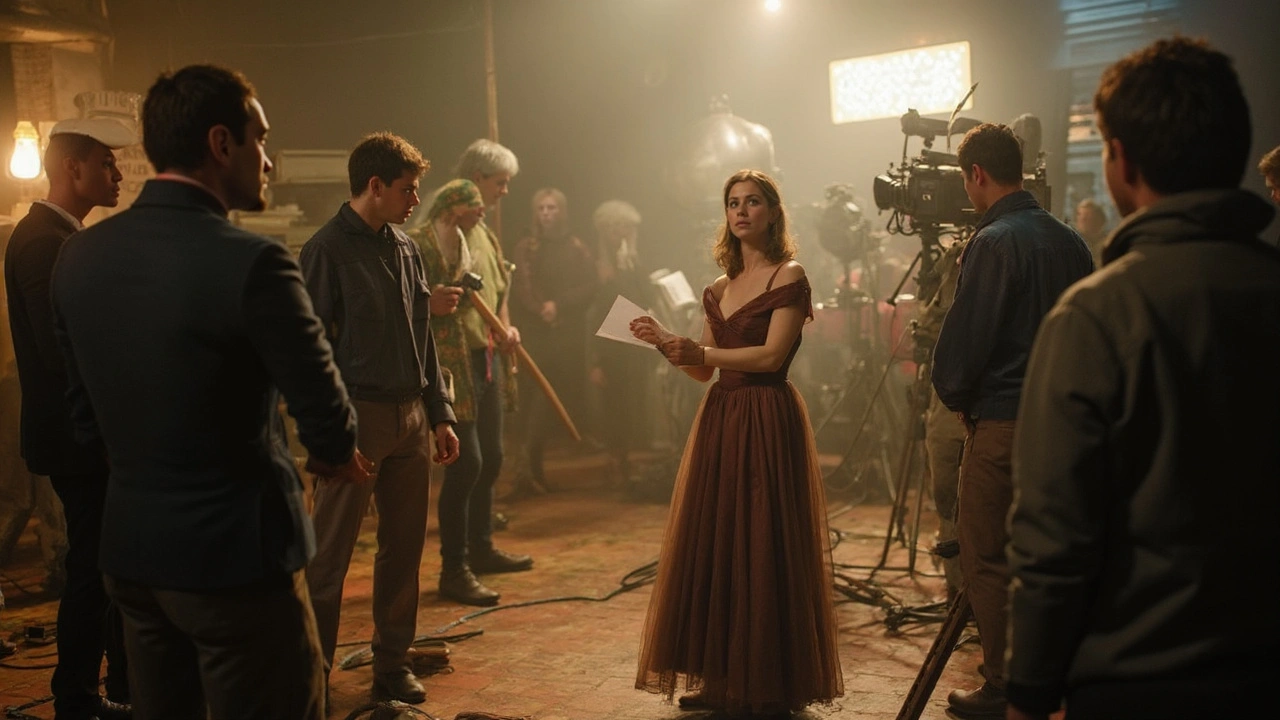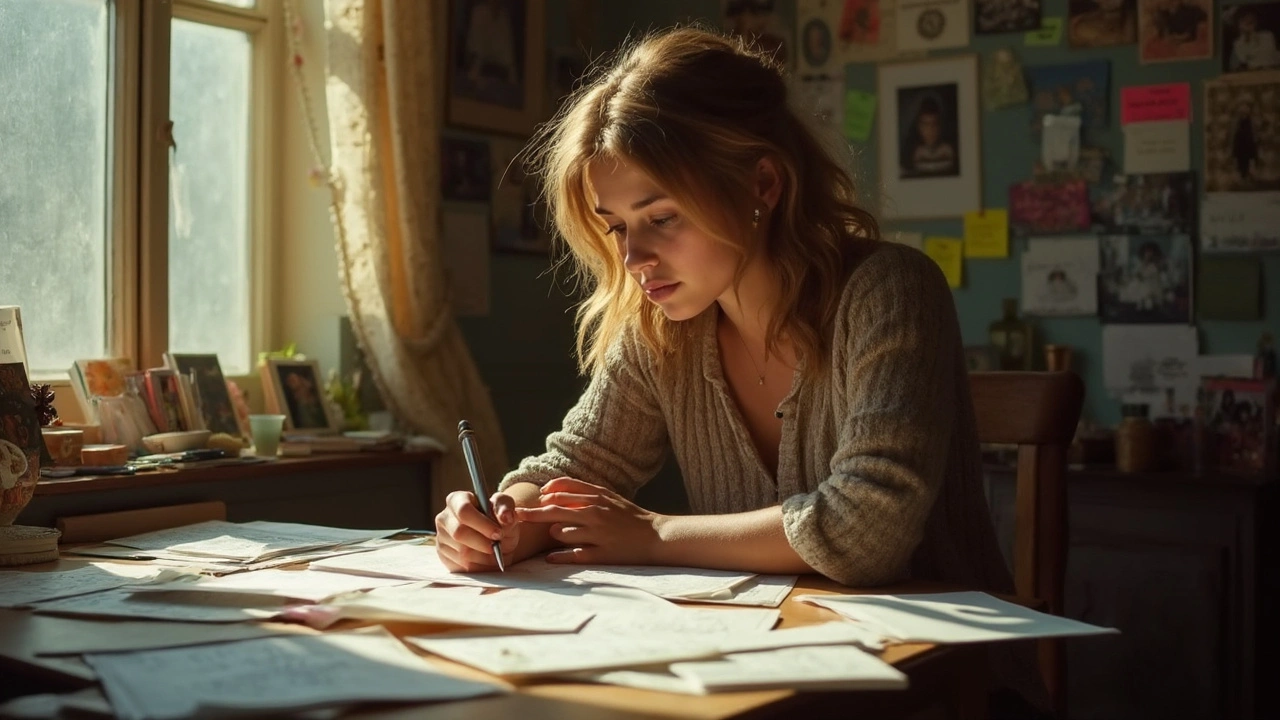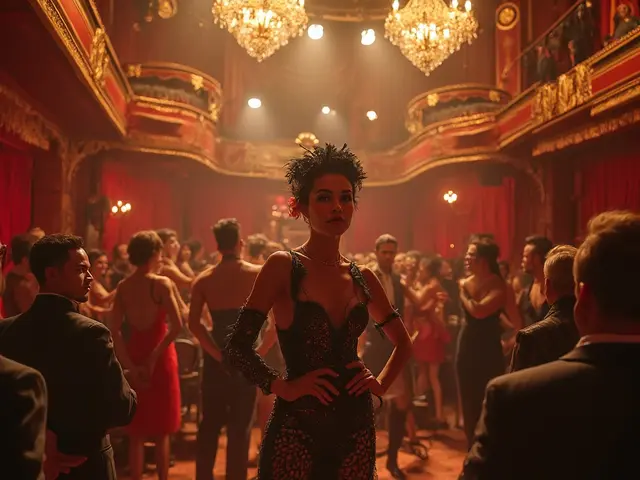Ever seen Lisa Maria Potthoff totally own a scene and thought, “How does she do that?” You’re not alone. There’s a real method to her work, and it’s a lot more than just memorizing lines or hitting your mark. Lisa digs deep, figuring out what makes each character tick—sometimes way before stepping foot on set.
She’s all about prep. Before filming even starts, Lisa likes to research the world her character lives in. For her role as police commissioner Sonia in the “Eberhofer” films, she hung out at actual police stations to watch how officers move and talk. If she’s playing a totally different type, she’s known to spend time with people in that environment, soaking up their vibe until she feels it herself.
And it’s not just research. Lisa keeps a notebook with thoughts, sketches, and even tiny lists—anything that helps her stay connected to the person she’s playing. If you’ve ever felt stuck trying to get into a role (or heck, even prepping for a big meeting), grabbing a notebook and jotting personal notes isn’t just for actors—it actually helps lock in the mindset.
- Key Steps in Lisa Maria Potthoff's Acting Process
- How She Prepares for Challenging Roles
- Behind-the-Scenes Insights and Fun Facts
- Tips Inspired by Lisa's Approach
Key Steps in Lisa Maria Potthoff's Acting Process
There’s a reason Lisa Maria Potthoff feels so real when you watch her, whether she’s playing a cop or a quirky neighbor. She’s got a process that actually works, and it’s not just actor-theory talk — these are steps she uses for every role.
- Script Breakdown: First up, Lisa digs deep into her scripts. She doesn’t just skim them. She notes motivations, little changes in mood, and even marks out keywords in her dialogue. For her, rereading a script isn’t boring, it’s like finding new clues every time.
- Building Backstory: Even if it’s not on the page, Lisa creates a personal backstory for each character. For “Franziskas” in the Eberhofer crime stories, she’d invent what her character was doing before a scene. That helps make her reactions feel natural, not forced.
- On-the-Ground Research: If she’s playing a profession she’s unfamiliar with, Lisa gets hands-on. Before her police commissioner role, she interviewed real officers and observed their routines. She’s said in interviews that spending a day at a Munich police station totally changed her body language on set.
- Physical Routine: She adapts her walk, gestures, and posture. For physical roles, she’s not shy about getting movement coaching. One of her trainers once pointed out how much your shoulders say about your confidence level. Lisa brings that right into her performances.
- Collaboration on Set: Lisa talks with directors and other actors all the time. She’ll ask how her co-actors see their own roles, so there’s a shared energy in every scene. On the set of "Dampfnudelblues", the cast would sometimes run through tough scenes together off-camera, figuring out beats before the cameras rolled.
- Emotional Prep: She practices mindfulness and quick reset routines before emotional scenes. She says if you carry stress from home, the camera picks it up. Sometimes, she listens to music that fits the mood of the character to get herself in the right mindset.
| Step | Example from Lisa's Work |
|---|---|
| Script Breakdown | Annotating Eberhofer scripts for tone shifts |
| Backstory Creation | Invented pre-scene histories for "Franziskas" |
| On-the-Ground Research | A day shadowing Munich police |
| Physical Routine | Walk/posture coaching for police roles |
| Collaboration | Workshopping scenes in "Dampfnudelblues" with cast |
| Emotional Prep | Listening to playlists to set the mood |
What’s cool is that you don’t have to be a professional actor to borrow Lisa’s steps. Breaking down your "script"—whether it’s a work presentation or a tricky convo—prepping physically, and syncing up with others can help anyone perform better. Seeing that behind-the-scenes process really shows just how purposeful her craft is and why she stands out in every film role she touches.
How She Prepares for Challenging Roles
If you’re curious how Lisa Maria Potthoff tackles those tricky or deeply emotional parts, you’re in for a treat. She doesn’t just wing it — she’s all about putting in the work up front. Take her performance in the drama “Winterkartoffelknödel.” That role needed her to balance humor and sadness, which isn’t easy. She admitted in an interview that she prepped by really diving into her character’s backstory, asking herself not just what her character would do, but why. This approach helps her react naturally, instead of coming off scripted.
Lisa swears by a few go-to strategies when prepping for complex roles:
- Physical Training: For “Dampfnudelblues,” where her character’s job turns physical, Lisa actually did light police drills and practiced the correct way to carry herself in uniform.
- Shadowing Professionals: She’s spent hours with real police officers, absorbing how they talk and react, especially in tense moments. This helped her nail those tough procedural scenes.
- Script Annotation: You’d find scribbles all over her scripts. She marks out what’s driving each scene, her character’s hidden motives, and sometimes questions to ask the director.
- Voice Work: Lisa records herself reading lines, then plays them back. She listens for tone and flow, tweaking until she feels the emotion is spot on.
- Personal Rituals: Before big scenes, Lisa practices a simple breathing routine. She says a few quiet mantras to center her focus and push aside nerves.
Ever wondered how much prep time this takes up? According to a recent film magazine, Lisa spends at least two weeks on focused preparation per role. That’s before rehearsals even start. It’s a good reminder that bringing a character to life is never about luck — it’s the hours you put in that show up on screen.
Here’s a quick look at how Lisa’s prep stacks up compared to other German actresses, based on recent film interviews:
| Actress | Average Prep Time Per Role | Main Prep Methods |
|---|---|---|
| Lisa Maria Potthoff | 2-3 weeks | Research, physical training, shadowing, script work |
| Karoline Herfurth | 2 weeks | Emotional memory, scene study |
| Nora Tschirner | 1.5 weeks | Table reads, improvisation |
So next time you see Lisa in action, remember: behind that smooth performance is a seriously thoughtful and well-tested process. If you want to step up your own acting game — or, honestly, any work that takes confidence — stealing a few of Lisa’s habits isn’t a bad place to start.

Behind-the-Scenes Insights and Fun Facts
If you think the Lisa Maria Potthoff magic just happens, nope—her process is packed with routines and quirky details most fans never see. She doesn’t show up late and wing it. For starters, Lisa likes to meet her co-stars for coffee or even a quick walk before the cameras roll. Her take? It helps everyone relax and break the ice, which really pays off with those natural, not-at-all-forced on-screen connections you see, especially in those popular "Eberhofer" films.
Ever notice how her characters often have a real-life feel? That’s totally on purpose. Lisa sometimes borrows actual phrases or gestures from people she’s spent time observing during her research—a police officer's way of standing, a neighbor’s dry sense of humor. In one interview, she admitted that a bunch of Franz Eberhofer’s quirks in the movies originally came from a buddy's uncle. Fans love spotting stuff like this when rewatching her scenes.
Another cool thing: Lisa is a champion of the early call time. She’s one of those actors happy to get to set before dawn, using the quiet to center herself and run through her marked-up scripts. She’s got a secret stash of highlighters and sticky notes tucked in her set bag—rumor has it she goes through at least three highlighters per project!
Want to see how method really pays off? Take a quick look at this breakdown of her prep for two standout film roles:
| Film | Prep Routine | Fun Fact |
|---|---|---|
| Sauerkrautkoma | Spent hours shadowing female detectives in Munich | Wore the same pair of boots as an officer for a week pre-shoot |
| Leberkäsjunkie | Practiced Bavarian dialect daily, even off set | Became the crew’s unofficial dialect coach |
And here’s something for the trivia lovers: Lisa’s director from "Winter Potato Dumplings" once joked that she’s the only cast member who showed up with a handwritten backstory for her character, including hobbies, a go-to snack, and even a made-up Instagram account. This level of detail is rare but it's what sets her apart among German actresses.
Tips Inspired by Lisa's Approach
Lisa Maria Potthoff doesn’t just “show up” on set. Her acting process is actually stuffed with practical tricks that anyone—from wannabe actors to folks who need confidence before a big presentation—can try out. So what does Lisa really do differently?
First off, she’s big on research. For her tough-cop role in the Eberhofer films, Lisa talked to real police officers to get the details right—down to how they stand and what they joke about on break. Her advice? Never skip homework. The more you know, the more natural you’ll feel in your part. If you can, shadow someone who does the job you’re trying to imitate, even for a short time.
- Keep a Character Notebook: Lisa is known for jotting everything down in one place—backstory ideas, bits of dialogue, and sketches. Not only does it help her get “in character,” it makes it easier to switch between roles when filming gets intense. Next time you’re prepping for a big role (or just a new challenge), grab a notebook or phone and start documenting your thoughts.
- Try Physical Prep: For physically demanding parts, Lisa works with trainers. She once shared in an interview how she practiced fight scenes step by step with stunt coordinators to nail the timing and keep things safe. Even if you’re not prepping for action scenes, doing a simple warm-up routine before anything stressful can put you in a confident mindset.
- Really Listen: Lisa always highlights listening to scene partners as her key trick on set. Acting is a two-way street. Even if you’ve rehearsed, stay ready to react to whatever’s thrown at you. This keeps performances fresh and honest—which is one reason she stands out in German film.
- Draw Inspiration From Real Life: Sometimes, Lisa weaves in real-life moments to add authenticity. She’s talked about observing people’s small habits in cafes or trains. Try doing the same: people-watch for a few minutes and you might pick up a gesture or expression you can use.
- Balance Work and Rest: Potthoff’s method includes solid downtime. She believes stepping away—going for a walk or spending time with her family—actually sharpens her instincts and creativity. Burnout is real, even in creative work, so don’t underestimate breaks.
Curious how this looks in practice? Here’s a quick snapshot of the prep routines Lisa might use, compared to standard acting approaches:
| Lisa Maria Potthoff's Method | Traditional Approach |
|---|---|
| On-set shadowing (e.g., police work for Eberhofer) | Learning from scripts/class only |
| Detailed character journaling | Basic notes/memory work |
| Physical warm-ups & scene walk-throughs | Little or no physical prep |
| Active listening to co-stars | Solo rehearsal focus |
| Regular downtime for balance | No set method for relaxation |
Next time you’re gearing up for something—an audition, job interview, or even public speaking—steal a trick or two from Lisa’s toolkit. Back up your work with real research, keep a notebook handy, and remember that being fully present can outshine pure memorization or showiness. After all, it’s the small, real things that make a performance pop—just like Lisa Maria Potthoff’s best moments on screen.




